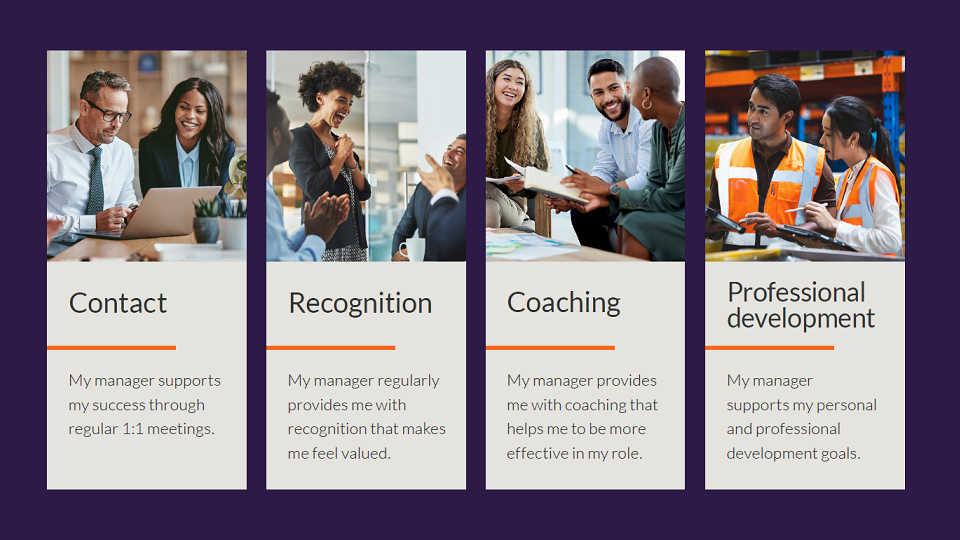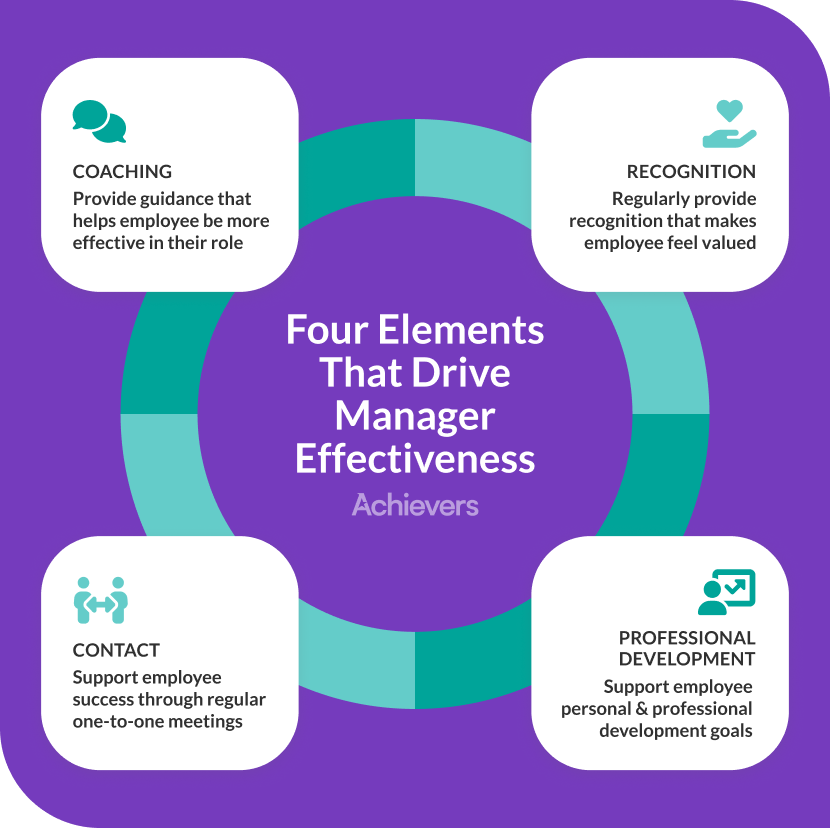Table of contents
The latest Manager Empowerment Report data shows a strong correlation between manager effectiveness and engagement, with 89% of respondents who would recommend their manager also reported being highly engaged. This means that your frontline managers play a crucial role in supporting your efforts to engage employees.
“Imagine the impact on your organisation if you could ensure that every manager was empowered to be effective,” says Dr. Natalie Baumgartner. “By investing in the right tools, resources, and training to empower managers throughout your organisation, you can scale manager effectiveness so every individual at every level has the support and leadership they need to excel.”
What is manager effectiveness?
Manager effectiveness is the manager’s ability to balance employee expectations and professional development with the organisation’s goals. An effective manager is equally focused on ensuring that work is completed within the organisation’s set processes — efficiently and on time — while also considering their team members’ employee experience.
Why is manager effectiveness important?
We know that manager effectiveness plays a pivotal role in fostering engagement, productivity, and retention. In today’s ever-evolving landscape, supporting managers demands a fresh approach — something that is especially true for HR leaders in Australia who are faced with specific workplace challenges.
In speaking with Chief People Officers in Melbourne, Australia, we uncovered that the topics that are most top-of-mind: violence in the workplace against frontline workers, people leader performance, employee mental health and well-being, inconsistent access to technology, and the struggle over the return to in-office work. Just as workplace conditions have changed over the past three years, so too have the expectations of managers.
To address these challenges, HR leaders are leaning on key concepts, such as:
- Creating trusting environments
- Focusing on the development of human skills
- Active employee listening
- Giving and receiving feedback
- Effective confrontation through communication — Understanding that conflict will exist and finding a way to manage it effectively.
The role of the manager is more than being directive and having the best technical skills. Managers play a crucial role in engaging, motivating, and retaining the employees on their teams. The Achievers Workforce Institute found four elements that drive manager effectiveness.
Four elements that drive manager effectiveness
- Contact: My manager supports my success through regular one-to-one meetings.
- Recognition: My manager regularly provides me with recognition that makes me feel valued.
- Coaching: My manager provides me with guidance that helps me to be more effective in my role.
- Professional development: My manager supports my personal and professional development goals.
Each factor alone doubles the likelihood that an employee would recommend their manager. When all four are present, the impact is nearly triples.
Imagine that each manager in your organisation is effective at engaging and motivating their employees. What would that mean for your business goals and for the company culture? By empowering your people leaders to have more meaningful and impactful conversations with their employees, and through manager training and the clear communication of expectations, better manager effectiveness — and employee and organisational performance — can be attained.
How do you measure manager effectiveness ?
Measuring manager effectiveness is important because they have the most direct contact with employees and play a pivotal role in nurturing employee productivity and organisational performance.
Ways to measure manager effectiveness include:
- Individual employee performance
- Team performance
- Employee engagement scores
- Retention and absenteeism
- Employee feedback
Gartner research shows that leader and manager effectiveness is a top priority for HR leaders in 2023.
10 tips on how to be an effective manager
With a team of employees looking to managers for their support and guidance, manager empowerment is crucial to their effectiveness. Here are 10 tips on how to be an effective manager:
- Know your people: Not just as employees, but as individuals
- Understand and adapt your management style: Align with the company culture and values
- Lead by example: Set the stage for the behaviors and actions you want to encourage
- Set up regular 1:1 check-ins with each team member: Provide coaching and mentorship
- Create a safe space to work: Physically, emotionally, and psychologically
- Give feedback: Understand what’s working and where there is room for improvement
- Listen to feedback: Encourage the direct and anonymous sharing of employee feedback
- Communicate openly: Share information and ideas freely
- Support your team: Go to bat for them and be their champion within the organisation
- Seek out manager training: Continue to develop and hone your skills
How can organisations drive manager effectiveness?
Less than half (48%) of managers have been trained in one-to-one meeting best practices, with less than a third being trained in professional development or recognition.
“Our data shows that manager effectiveness directly impacts employee engagement, with recognition and professional development playing especially big roles in driving effectiveness,” says Achievers Chief Workforce Scientist Dr. Natalie Baumgartner. “Organisations need to offer widespread training to all managers to see direct business impact at every level.”
- 70% of managers are unclear on how they’re success is being measured
- Managers who receive quarterly training are 51% more likely to recommend their own manager
- 19% of managers say that they have never received training from their company
Good managers require training, support and the right tools and resources. A bad manager is one that is often simply under-supported, under-developed, and under-engaged. Thus, it’s imperative that every organisation empowers all of their front-line people leaders with regular, consistent, cross-functional training.
Learn more about the global data behind manager effectiveness and empowerment in the Workforce Institute Manager Empowerment Report.






